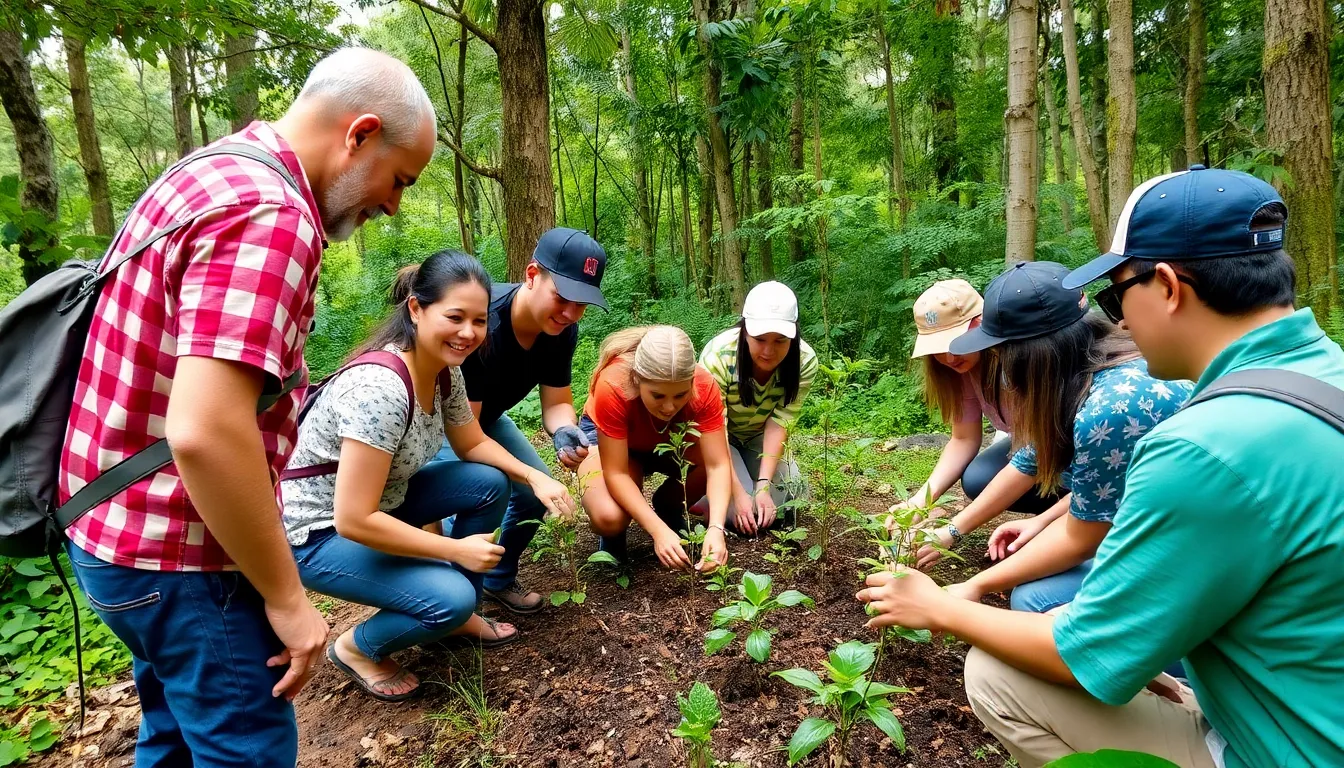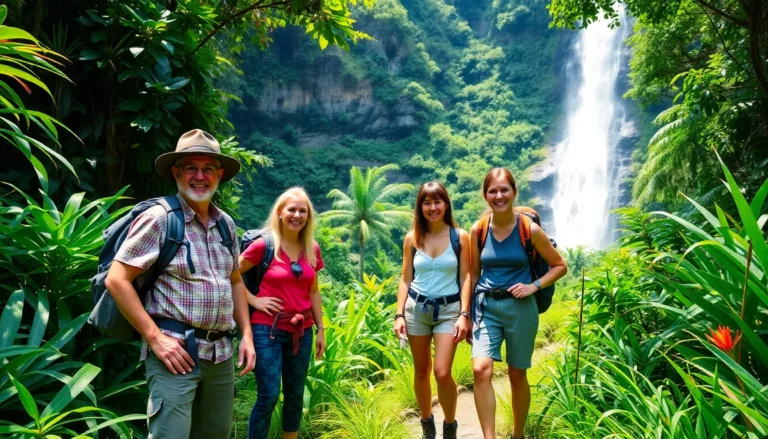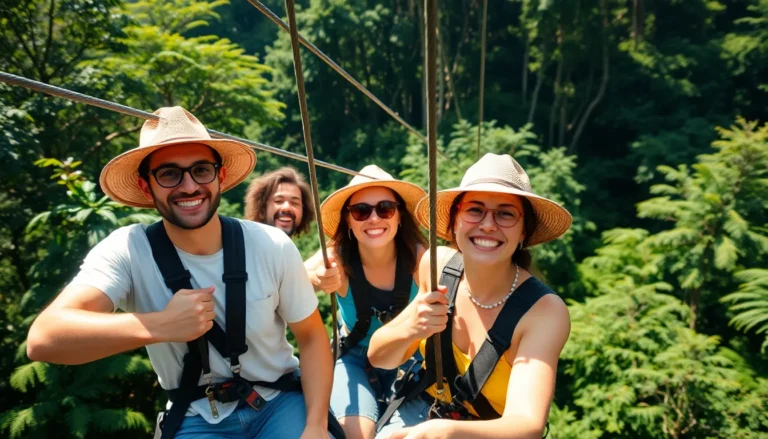Imagine sipping a delicious cup of locally sourced coffee while surrounded by breathtaking landscapes, all without leaving a carbon footprint the size of a small country. Welcome to the world of ecotourism, where adventure meets responsibility and Mother Nature gives a thumbs up. This isn’t just about snapping Instagram-worthy selfies; it’s about making a positive impact on the planet while enjoying its wonders.
Benefits of Ecotourism
Ecotourism promotes sustainable travel practices that conserve the environment and support local communities. This form of tourism prioritizes the well-being of natural ecosystems while enhancing visitor experiences. Ecotourists seek authentic interactions with local cultures, fostering a deeper understanding of their surroundings.
Travelers engage with wildlife and pristine landscapes, encouraging biodiversity conservation. Activities such as hiking, birdwatching, and snorkeling often form the core of ecotourism adventures. These activities offer unique opportunities to connect with nature while minimizing human impact.
Local economies benefit significantly from ecotourism. Communities that host ecotourists often generate income through eco-friendly accommodations and tours, creating jobs and promoting sustainable practices. Tourists who choose local services further enhance the economic benefits of their visit.
Environmental education plays a crucial role in ecotourism. Participants gain insight into environmental challenges and solutions, increasing their awareness of ecological issues. Learning opportunities often include workshops and guided tours led by local experts, enriching the travel experience.
Another aspect is the emphasis on responsible travel. Ecotourists often follow the “Leave No Trace” principles, ensuring minimal impact on delicate landscapes. Respect for wildlife and local customs remains a priority for travelers committed to sustainable practices.
Overall, ecotourism provides a holistic approach to discovering the natural world while reinforcing conservation efforts. It effectively melds adventure with responsibility, fostering a greater appreciation for the planet’s resources and beauty.
Environmental Benefits of Ecotourism

Ecotourism delivers significant environmental advantages that contribute to the health of ecosystems while promoting responsible travel.
Conservation of Natural Resources
Natural resources benefit from ecotourism initiatives that emphasize sustainable practices. Ecotourists often participate in activities that promote conservation, such as clean-up efforts and reforestation projects. These efforts reduce waste and protect local ecosystems. Travelers support conservation programs through participation fees, ensuring funds are available for preserving wildlife and habitats. Access to pristine areas raises awareness of environmental issues, often leading to more responsible consumption patterns. By interacting with conservation initiatives, tourists foster a deeper understanding of how their actions impact the environment.
Protection of Wildlife Habitats
Wildlife habitats receive protection through eco-focused tourism that prioritizes ecosystem integrity. Local guides educate tourists about the importance of preserving native species and their environments. Protection measures include establishing wildlife reserves and creating protected areas for sensitive ecosystems. Communities gain from ecotourism as it generates funding for wildlife conservation projects, ultimately reducing poaching and habitat destruction. By choosing eco-friendly travel options, tourists support initiatives that directly benefit wildlife and maintain biodiversity. Through ecotourism, travelers help ensure that future generations can appreciate thriving natural habitats.
Economic Benefits of Ecotourism
Ecotourism generates substantial economic benefits for communities by focusing on sustainability and responsible travel practices. This sector creates numerous opportunities for growth and development.
Job Creation and Local Development
Job creation flourishes through ecotourism initiatives. Local guides gain employment by leading eco-tours that highlight unique natural features. In addition, sustainable accommodations, such as eco-lodges, hire staff from nearby communities, fostering economic stability. Local artisans benefit by selling handmade goods to tourists, promoting cultural preservation alongside income generation. Furthermore, investments in infrastructure, like improved roads and facilities, support communities while enhancing visitor experiences.
Support for Local Businesses
Local businesses thrive from increased tourist foot traffic. Restaurants featuring local cuisine see an upswing in customers seeking authentic experiences. Tour operators specializing in eco-friendly adventures capitalize on the growing interest in sustainable travel. Shopping for locally sourced souvenirs directly supports artisans and promotes regional craftsmanship. Ultimately, ecotourism fosters a symbiotic relationship between visitors and local enterprises, creating lasting economic resilience.
Cultural Benefits of Ecotourism
Ecotourism fosters a deep connection between travelers and local cultures, enhancing appreciation for traditions and customs.
Preservation of Local Traditions
Local cultures flourish through ecotourism as communities share their heritage. Tourism encourages the continuation of traditional practices like artisanal crafting, dance, and music. Cultural festivals draw visitors, showcasing unique celebrations while providing financial support. When tourists engage with local traditions, they help ensure these practices remain vibrant. Increased interest in native cuisine promotes culinary heritage, enhancing sustainable food practices. Ecotourism becomes a platform for storytelling, where locals pass down histories and traditions through direct interaction.
Promotion of Cultural Exchange
Cultural exchange enriches the travel experience for both visitors and hosts. Travelers often gain insights into daily life through participation in local activities. Workshops on traditional crafts or cooking classes create immersive experiences. Ecotourists value personal connections forged during shared activities, leading to mutual understanding. Language barriers diminish when cultures collide through shared experiences. This interaction promotes respect for diverse ways of life, fostering global awareness. Economic benefits arise as tourism stimulates interest in local arts and crafts, creating a market for cultural products.
Social Benefits of Ecotourism
Ecotourism significantly impacts local societies by fostering community engagement and education. It empowers communities, raises awareness of environmental issues, and promotes cultural exchange.
Community Empowerment
Community members gain economic and social strength through ecotourism. Local enterprises develop as residents start eco-friendly accommodations and tour services. Pride in heritage increases when locals share their customs and traditions with visitors. Employment opportunities expand for guides, artisans, and hospitality staff. Increased revenues enhance public services like education and healthcare. Community-led initiatives often arise, promoting sustainable practices and conservation efforts. Participation in decision-making allows residents to have a voice in tourism development.
Education and Awareness
Ecotourism serves as an educational platform, informing travelers about local ecosystems and cultures. Visitors learn about conservation needs and local environmental challenges through interactive experiences. Workshops provide insights into traditional practices, biodiversity, and sustainable living. Knowledge gained fosters respect for local customs and wildlife. Tourists often leave with a renewed commitment to responsible travel and environmental stewardship. Educational initiatives raise awareness not only among visitors but also within host communities. Collaborative projects further enhance understanding of ecological responsibility and cultural preservation.
Conclusion
Ecotourism stands as a powerful force for positive change in the travel industry. By prioritizing sustainability and cultural respect it fosters a unique connection between travelers and the environments they explore. This approach not only benefits local economies but also enhances the overall travel experience through meaningful interactions and education.
As travelers embrace ecotourism they contribute to the preservation of natural resources and cultural heritage. This commitment to responsible travel paves the way for a more sustainable future. Ultimately ecotourism invites everyone to adventure responsibly while making a lasting impact on the planet and its communities.




